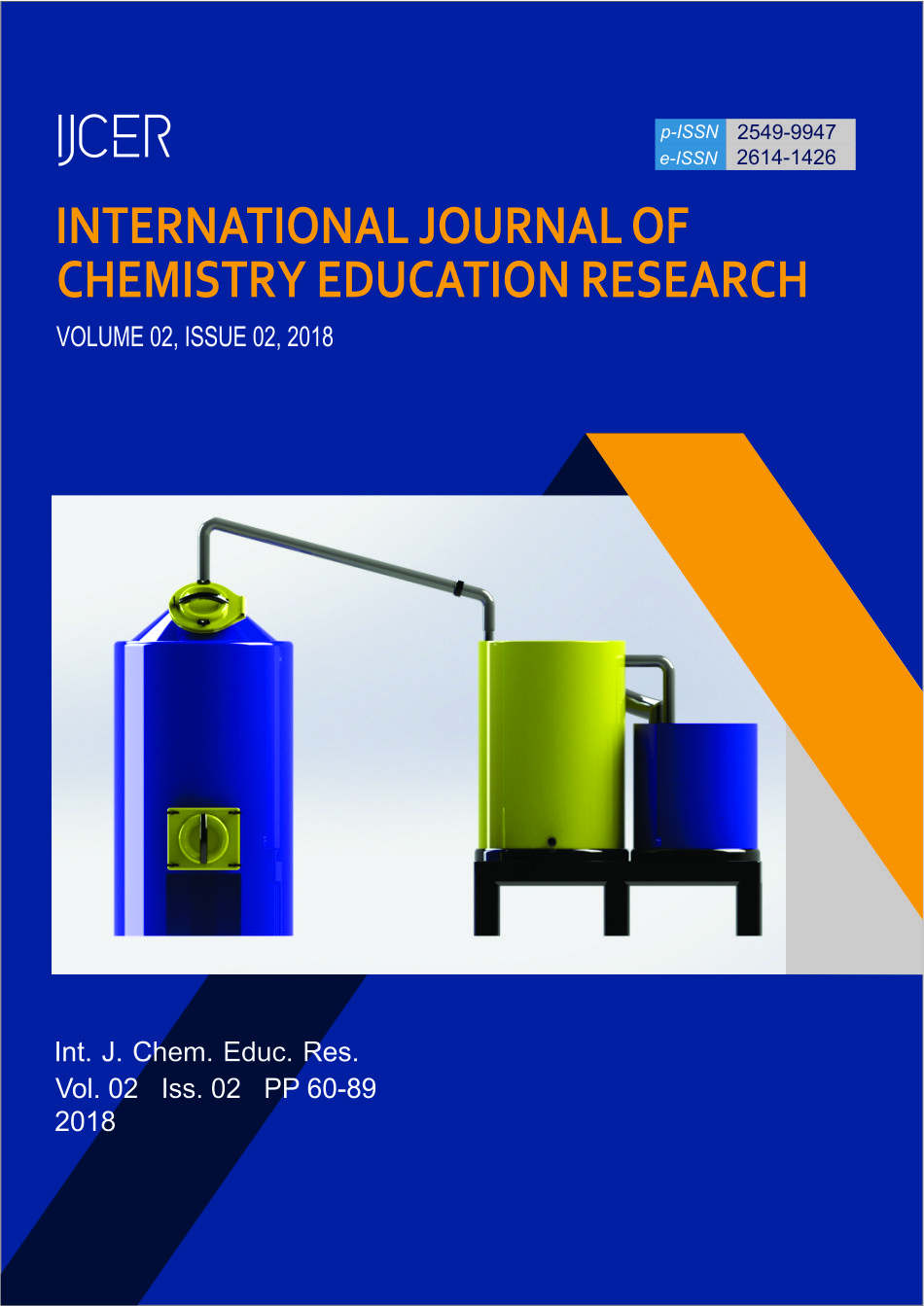Main Article Content
Abstract
Nowadays the development of thinking skills has become the main focus in educational research. Standard of graduate competency mandate that graduates of schools to universities in Indonesia must have thinking skills. Related to this, the goal of this quasi-experimental study was to describe the effectivity of Project-Based Learning (PjBL) student worksheets to improve students' critical thinking skills (CTS) in the topic of mixtures separation. This study was carried out in the SMPN 1 Pugung by using the Non-Equivalent (Pretest-Posttest) Control Group Design. The effectivity of PjBL student worksheets measured based on the n-gain and the effect size values. Statistically, the n-gain value of the experimental class was higher than the control class. The effect size value was in medium categorized. These results indicated that the PjBL student worksheets were effective to improve students' CTS in the topic of mixtures separation.
Keywords: student worksheets, project-based learning, critical thinking skills, mixtures separation
Article Details
Author retain copyright and grant the journal right of first publication with the simultaneously licenced under A Creative Commons Attribution (CC-By-SA) 4.0 License that allows others to share the work with an acknowledgment of the worsk's authorship and initial publication in this journal.
References
- K.J. Topping and A. Bryce, EP, 24, 5, 595-621, (2004).
- R. Fisher, Thinking Skills. Learning to Teach in the Primary School Series 1 Edited by J. Arthur, T. Grainger, and D. Wray,, (Routledge, United Kingdom, 2006), pp. 374-386.
- L.A. Burke and J.M. Williams,. ECDC, 179, 7, 949-968, (2009).
- D. Colcott, B. Russell, and H. Skouteris, TD, 1, 17-27, (2009).
- R.N. Beyers, JSET, 19, 5, 447-455, (2010).
- C. Aubrey, K. Ghent, and E. Kanira, IJEYE, 20, 4, 332-348, (2012).
- D. Moseley, J. Elliott, M. Gregson, M., and S. Higgins, BERJ, 31, 3, 367-390, (2005).
- A. Benešová, M. Hirman, F. Steiner, and J. Tupa, Analysis of Education Requirements for Electronics anufacturing within Concept Industry 4.0. International Spring Seminar on Electronics Technology (ISSE), (Pilsen, Czech Republic, 2018), pp 1-5.
- M. Baygin, H. Yetis, M.Karaköse, and E. Akin,. An Effect Analysis of Industry 4.0 to Higher Education, Proceeding of 15th International Conference on Information Technology Based Higher Education and Training (ITHET). (Istanbul, Turkey, 2016), pp. 8-10.
- C. Diawati, Liliasari, A. Setiabudi, and Buchari. AIP, 1, 1, 1-6. (2017).
- N.D. Jamaludin, “Pengaruh Pembelajaran Berbasis Proyek Terhadap Kemampuan Berpikir Kritis dan Sikap Ilmiah pada Materi Tumbuhan Biji”, Bachelor. Thesis, STAIN Kudus Jawa Tengah, 2017
- I.A.K. Sastrika, I.W. Sadia, and Muderawan. JPPII, 3, 1, 1-10, (2013)
- C. Diawati, Liliasari, A. Setiabudi, and Buchari. JCE, 95, 3, 468-475 (2018).
- H.E. Fini, F. Awadallah, M.M. Parast, and T. Abu-Lebdeh, EJEE, 43, 3, 473-488. (2017)
- R. Mardiani, “Pengaruh Model Pembelajaran Berbasis Proyek (PjBL) terhadap Hasil Belajar Siswa pada Konsep Impuls dan Momentum”, Bachelor. Thesis, Universitas Islam Negeri Syarif Hidayatullah, (2017).
- D. Insyasiska, S. Zubaidah and H. Susilo, JPB. 7, 1, 9-21, (2015).
- R.R. Hake, AJP, 66, 1, 64-74. (1998).
- E.W. Minium and B.M.K.G. Bear, Statistical Reasioning In Psychology And Education. (United State of America, 1993)
- R. H. Ennis, Critical Thinking (University of Illinois, New York, 1981)
References
K.J. Topping and A. Bryce, EP, 24, 5, 595-621, (2004).
R. Fisher, Thinking Skills. Learning to Teach in the Primary School Series 1 Edited by J. Arthur, T. Grainger, and D. Wray,, (Routledge, United Kingdom, 2006), pp. 374-386.
L.A. Burke and J.M. Williams,. ECDC, 179, 7, 949-968, (2009).
D. Colcott, B. Russell, and H. Skouteris, TD, 1, 17-27, (2009).
R.N. Beyers, JSET, 19, 5, 447-455, (2010).
C. Aubrey, K. Ghent, and E. Kanira, IJEYE, 20, 4, 332-348, (2012).
D. Moseley, J. Elliott, M. Gregson, M., and S. Higgins, BERJ, 31, 3, 367-390, (2005).
A. Benešová, M. Hirman, F. Steiner, and J. Tupa, Analysis of Education Requirements for Electronics anufacturing within Concept Industry 4.0. International Spring Seminar on Electronics Technology (ISSE), (Pilsen, Czech Republic, 2018), pp 1-5.
M. Baygin, H. Yetis, M.Karaköse, and E. Akin,. An Effect Analysis of Industry 4.0 to Higher Education, Proceeding of 15th International Conference on Information Technology Based Higher Education and Training (ITHET). (Istanbul, Turkey, 2016), pp. 8-10.
C. Diawati, Liliasari, A. Setiabudi, and Buchari. AIP, 1, 1, 1-6. (2017).
N.D. Jamaludin, “Pengaruh Pembelajaran Berbasis Proyek Terhadap Kemampuan Berpikir Kritis dan Sikap Ilmiah pada Materi Tumbuhan Biji”, Bachelor. Thesis, STAIN Kudus Jawa Tengah, 2017
I.A.K. Sastrika, I.W. Sadia, and Muderawan. JPPII, 3, 1, 1-10, (2013)
C. Diawati, Liliasari, A. Setiabudi, and Buchari. JCE, 95, 3, 468-475 (2018).
H.E. Fini, F. Awadallah, M.M. Parast, and T. Abu-Lebdeh, EJEE, 43, 3, 473-488. (2017)
R. Mardiani, “Pengaruh Model Pembelajaran Berbasis Proyek (PjBL) terhadap Hasil Belajar Siswa pada Konsep Impuls dan Momentum”, Bachelor. Thesis, Universitas Islam Negeri Syarif Hidayatullah, (2017).
D. Insyasiska, S. Zubaidah and H. Susilo, JPB. 7, 1, 9-21, (2015).
R.R. Hake, AJP, 66, 1, 64-74. (1998).
E.W. Minium and B.M.K.G. Bear, Statistical Reasioning In Psychology And Education. (United State of America, 1993)
R. H. Ennis, Critical Thinking (University of Illinois, New York, 1981)




